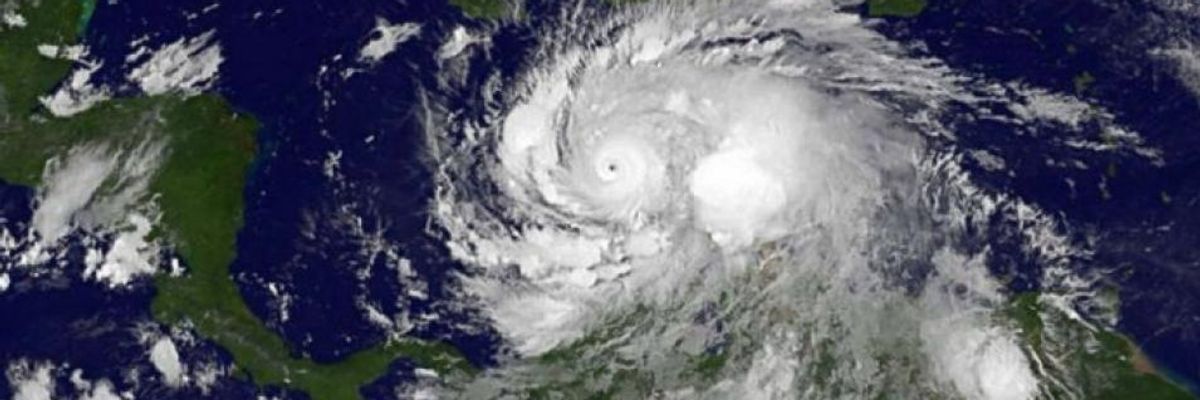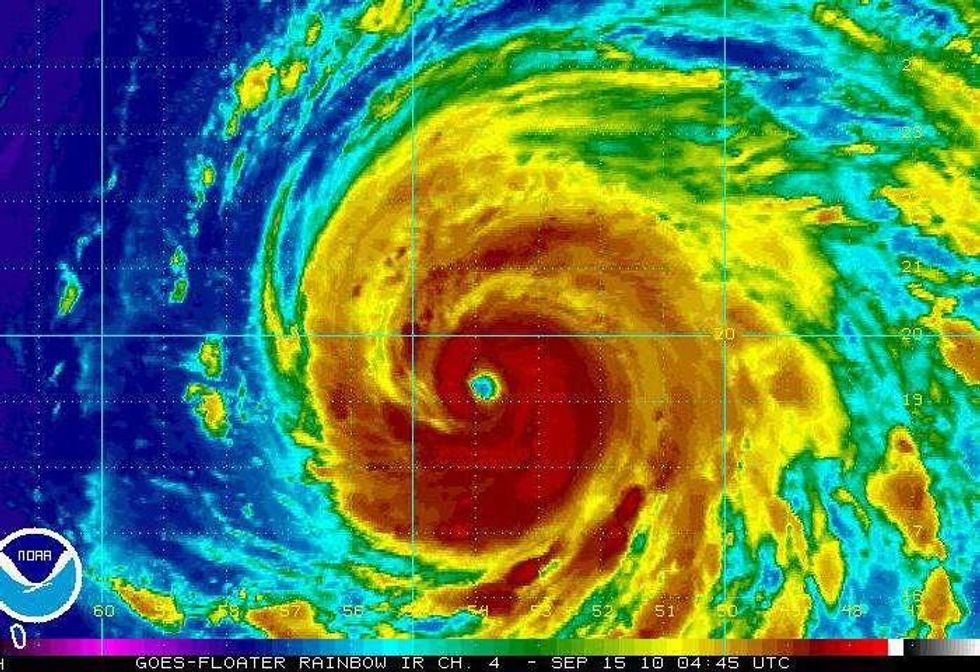The slow process by the Trump administration of selecting and nominating candidates for high level government positions to lead federal agencies is continuing to creep along now nearly ten months into his presidency.
Why should we care? These agency leaders affect the lives of literally every person in this country. I recently reviewed some of the nominees for key science-based agencies. There is a pattern of nominating people with conflicts of interest, or that have a history of opposing the very mission of the agencies they are appointed to lead. And there are some nominees that just don't hold the qualifications needed for the positions they are being appointed to. While I didn't do a comprehensive review, I found too many examples of these problems to ignore.
As a former NOAA scientist and manager, it was particularly troubling to me that two nominees this week to lead my former agency fit this disturbing pattern. Last night, President Trump nominated Barry Myers to be the Undersecretary of Commerce for Oceans and Atmosphere, the Administrator of NOAA. Earlier, he nominated Dr. Neil Jacobs to be the Assistant Secretary of Commerce for Environmental Observation and Prediction. Adm. Timothy Gallaudet to be Assistant Secretary of Commerce for Conservation and Management.
To be fair, I believe that Admiral Gallaudet, former oceanographer of the Navy is an excellent choice for NOAA, as do others I respect.
Myers and Jacobs: conflicted leaders?
A nominee to head the National Oceanic and Atmospheric Administration (NOAA) just been announced and follows the pattern of nominating conflicted business leaders to lead agencies.
The nominee, Barry Myers, is the CEO of AccuWeather. His company is highly successful and perhaps better known to many than NOAA itself. Basically, their business model is to take NOAA data and products on weather, developed with taxpayer dollars, and deliver them to the public in a proprietary form that customers want. He has been a strong advocate against NOAA having the capability to provide such products directly to the public, hence the rather boring form of NOAA forecasts which is interpreted and commoditized by companies like AccuWeather and many others.
AccuWeather has been active in efforts to undercut the role of NOAA. In 2005, AccuWeather, under the leadership of Myers' brother Dr. Joel Myers, worked with Senator Rick Santorum on a bill to severely restrict the National Weather Service's ability to provide weather forecasts to the public. The company donated to Santorum's then Senate campaign and has been vocal about their interest in downsizing NOAA in the interest of privatizing weather forecasting.
Compounding these concerns, Dr. Neil Jacobs, Chief Atmospheric Scientist for Panasonic Weather Solutions has also advocated for a greater role for private weather data. His company sells their data and model outputs to NOAA as input to weather forecasts. He has advocated for a greater role for the private sector much as Mr. Myers has. Testifying before the House Science Committee in July Dr. Jacobs advocated for the proprietary model his company developed as "better" than the NOAA forecasting models. According to a report from the hearing Dr. Jacobs stated that, "... that a private company like Panasonic can move more quickly than NOAA in improving its models and processes, because it does not have to go through the years of quality and reliability testing that NOAA requires when implementing major model upgrades." That is probably true but far from comforting for a service vital to public safety. Will Dr. Jacobs carry that approach, shortcutting reliability testing in order to get a product to market, into NOAA? I hope not.
If appointed, Myers and Jacobs will now be in a position to make such decisions about NOAA's work. It is easy to see how private weather companies like AccuWeather or Panasonic could directly benefit from decisions made by Myers and Jacobs; and the likely incentivizes to make decisions that benefit Myer's family's business and the business Jacobs worked with and advocated for for years.
Will Myers cut all financial ties to AccuWeather before accepting such an appointment? How about Jacobs? I won't hold my breath, given the current industry ties still held many members of this administration starting at the top
Do people have a right to accessible weather information that they pay for with their tax dollars? Myers and AccuWeather, as well as Jacobs and Panasonic appear to think not. I happen to think Americans deserve access to the life-saving forecasts and other weather information provided to the public by NOAA scientists.
NOAA's mission is to protect people and property

Most of the public may only know of NOAA because their logo appears on hurricane or tornado forecasts. Others because they follow weather forecasting closely and many forecasts refer to NOAA.
For those of us who spend a lot of time on the ocean, we certainly know that NOAA is responsible for producing nautical charts. In fact the part of the agency that produces nautical charts critical to shipping, boating, and naval operations is the oldest physical science department in the government dating to 1807. The National Weather Service (NWS) in NOAA was formed in 1870, and the National Marine Fisheries Service (NMFS), which studies and manages living marine resources, dates to 1871. I am a proud former scientist and manager of NMFS, first as a student trainee and ultimately as the deputy director of the agency.
Ok, that's all ancient history (including my time at NOAA), so what does the agency do? Simply put, NOAA does a wide range of basic and applied scientific research to better understand our oceans and atmosphere, from deep sea exploration to space weather. (If you can't imagine why we care about weather in space, you can find out how it can affect everything from satellites to cellphones!)
NOAA's research provides information to the public, policy makers, and other scientists in the US and around the world. NOAA scientists partner with a huge number of scientists in academia, industry, and private institutions in collaborative research in addition to providing critical long-term data series that no one else has the resources nor the mandate to collect and share with the public.
So NOAA is a science agency, but its science is applied to create weather forecasts, manage fisheries, protect whales and other marine mammals, help states manage coastal areas, create charts, inform international negotiations on addressing the challenges of management of shared resources in the oceans and atmosphere, forecast tsunami risks, measure and monitor the ongoing process of climate change, and more.
The leadership of the agency can impact all of us in one way or another. Care about severe weather and risks to your life and property? Better thank NOAA. Care about your favorite beach and whether it is eroding or will it be clean and safe? Better thank NOAA. Care about your farm and the coming growing season's weather? Better thank NOAA. Or the fish you enjoy to catch or eat? Better thank NOAA.
A lack of respect for science
Mr. Myers is not a scientist but a businessman. That is in the same vein as many other Trump appointees. Some say that bringing a business approach to government is essential. I am not one of them. I have been a senior manager in government and have also run a small business. Totally different perspectives. But of course even these different perspectives can inform one another.
But NOAA is truly a science agency. The leader of the organization doesn't have to be a scientist but needs to be deeply engaged in the process and perspective of science and scientists in order to be successful with regard to the public interest.
Mr. Myers was interviewed about his leadership of Accuweather by the Wall Street Journal in 2014. This Q & A jumped out at me:
"Did you ever think about going into meteorology?
I did actually. I was originally enrolled in meteorology as an undergraduate. I then dropped out of school because I was a horrible student. I was never interested in learning, which I look at now as sort of funny."
Well, not that funny really. There is always a lot to learn at NOAA. I found that out to my continuous joy. I hope the next leader of the agency is deeply steeped in its scientific work and embraces the chance to learn how that science is critical to the nation.


